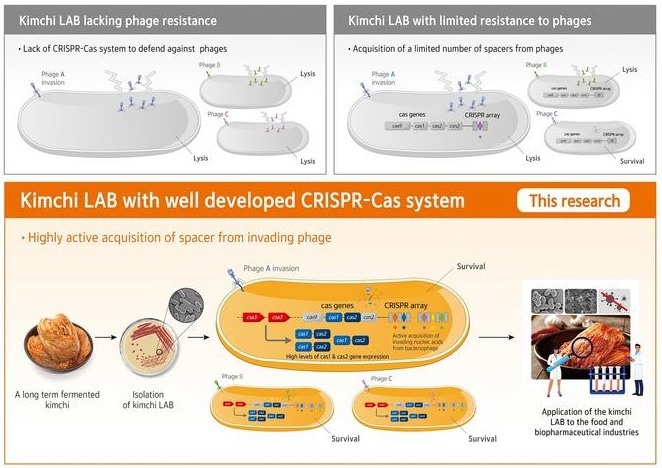Reviewed by Danielle Ellis, B.Sc.Nov 2 2023
Scientists from the World Institute of Kimchi have successfully extracted lactic acid bacteria (LAB) strains that exhibit remarkable phage resistance.
 Kimchi lactic acid bacteria with a high level of resistance to phage. Image Credit: The World Institute of Kimchi.
Kimchi lactic acid bacteria with a high level of resistance to phage. Image Credit: The World Institute of Kimchi.
These strains were obtained from kimchi that underwent extended fermentation at low temperatures. Additionally, the research team unveiled the defense mechanisms employed by these LAB strains to fend off phages, which are viruses that infect and replicate within bacteria.
Kimchi, a traditional Korean culinary delight, is a vegetable product fermented through lactic acid. Unlike conventional dairy fermentation, which occurs in a sterile, enclosed system, kimchi undergoes spontaneous fermentation initiated by diverse microorganisms found in its raw ingredients within an open, non-sterile fermentation environment.
Hence, a diverse range of lactic acid bacteria (LAB) can participate in the fermentation of kimchi, with the predominant LAB species and their prevalence periods varying depending on the specific environment.
To uncover the genetic characteristics of LAB in long-term, low-temperature fermented kimchi, scientists at the World Institute of Kimchi collected 34 kimchi samples from various regions across South Korea, all of which had been fermented for more than six months at temperatures ranging from −2 to 10 ℃.
Remarkably, in over 88% of the sampled kimchi batches, a particular LAB strain, Pediococcus inopinatus, emerged as the dominant species.
In-depth analysis through whole-genome sequencing revealed that P. inopinatus possesses a highly sophisticated Clustered Regularly Interspaced Short Palindromic Repeat (CRISPR) system.
CRISPR constitutes an adaptive immune system found in prokaryotes, and its composition varies depending on the specific lactic acid bacteria (LAB) strain.

Image Credit: Nungning20/Shutterstock.com
In particular, P. inopinatus strains exhibit an enhanced presence of the csa3 gene, responsible for encoding transcription factors for the cas genes, when compared to other LAB strains. Furthermore, due to the robust expression of cas genes, P. inopinatus strains store a significantly larger amount of genetic information related to phages.
Consequently, following an initial phage infection, P. inopinatus becomes more proficient in preventing subsequent infections by similar phages. In the kimchi industry, these LAB strains are employed as starter cultures to produce standardized kimchi with superior sensory attributes.
Much like how humanity faces the threat of the COVID-19 virus, these LAB starters are also susceptible to phage infections. Hence, the development of phage-resistant LAB strains is imperative.
Additionally, among the kimchi LAB strains investigated in this study, one exhibited a gene sequence with the potential to confer immunity not only against phages but also against mammalian viruses.
P. inopinatus possesses a unique, well-developed CRISPR system that can defend against a variety of viral invasions.”
Dr Hae Choon Chang, Study Corresponding Author and President, World Institute of Kimchi, National Research Council of Science and Technology
Chang added, “We are planning to study the antiviral activity and analyzing the immune spectrum of P. inopinatus, and we expect that the excellent antiviral ability of these kimchi LAB strains can be used not only in food but also in the pharmaceutical industry.”
Source:
Journal reference:
Mun, S. Y., et al. (2023) Pediococcus inopinatus with a well-developed CRISPR-Cas system dominates in long-term fermented kimchi, Mukeunji. doi.org/10.1016/j.fm.2023.104385.